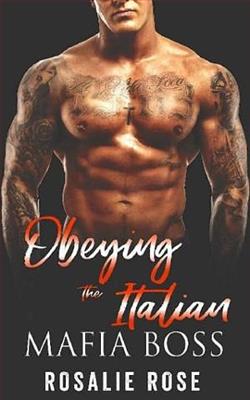Page 10 of The Strawberry Thief
Mirrors
1
Friday, March 17
My father was a silent man: so silent that you sometimes almost forgot that he was there; that he was able to speak at all. He used to say that his brother had used all the words they’d had: that when they were separated at birth one got the voice, and the other the heart.
He had been one of a pair of twins. But twins had been too much of a burden for his mother, who already had four children, and his brother had gone north to a cousin in Nantes, and my father had been brought up by Tante Anna – my father’s aunt, a widow whose first husband had been killed in the Great War, and who then had married her brother-in-law, only to see him dead of the flu before they could have children.
A thin, spiky woman all in black, with a silver-and-black cross in the lace at her throat and grey hair pulled so tightly back from her face that half the skin went with it. That cross of hers. I remember it well. The black part was jet, for mourning. The silver was to match her hair, because, in spite of it all, she was vain, and liked the figure she showed to the world; the elegance of it, perhaps, or the pleasing austerity. In any case, she was a Catholic by convenience, as so many people were. It would not have done, in that turbulent time, to admit to having been anything else.
It never occurred to my sister and me to consider that we might be Jews. And yet I suppose we were, by birth: our mother’s maiden name was Zwolaskowki, and my sister was named after her, although we called her Mimi instead; Naomi being far too cumbersome for such a little bit of a thing. It’s sad that I remember the aunt better than I do my mother. But my mother died when I was four, giving birth to my sister, and the aunt – whose name had once been Hannah, but who in troubled times had learnt to spell it the way it was always pronounced – took over the mothering process with the same cool efficiency that she had done with my father. I was named Narcisse after him, which filled me with despair as a boy, but I grew into it eventually, and besides, as my father said, I could have been named for his brother, Modeste.
Will there be much more of this,père? It seems as if the old man is taunting me deliberately. There are pages and pages of this: of how the family moved; of how the brothers lost track of each other; of how the other twin, Modeste, married, but was killed by the Boche. Narcisse has a captive audience. His retaliation, perhaps, for all those dull sermons he heard as a boy. The great-aunt, I understand, was strict: forcing the siblings to church every week, while their father ran the farm that had once been the great-aunt’s husband’s. Forgive me,père. No more today. Instead I shall seek out Vianne Rocher, as I meant to the other day, in the hope that she may prove more helpful than Roux on the subject of Rosette’s inheritance.
The shop was empty when I arrived, except for Rosette, who was drawing. She likes to sit on the floor to draw, and on a busy day one must be careful not to step on her rows of coloured pens, chalks and pencil-crayons. Rosette is nearly sixteen years old, although she does not look it. She has the small face of a much younger child, made even smaller by the volume of her corkscrew-curly, pale red hair. She looked up as I came in, a black pencil-crayon in one hand.
A sudden icy gust of wind from the door blew my soutane up around my knees. Rosette laughed, and made an explosive sound.
‘BAM!’
Vianne put her head around the kitchen door. ‘Francis. How nice to see you. And during Lent, too.’ She smiled, to let me know she did not mean it as mockery. ‘Let me bring you some hot chocolate.’
I accepted the china cup, its contents dark and sweet as sin. I took a token sip, and said: ‘I see Michel Montour has decided to renovate Narcisse’s farm himself.’
Vianne nodded. ‘They’re moving in with their son, Yannick. They’ve put their house on the market.’
How does she know these things,mon père? How does she know the things I do not hear? Of course, Michel and Michèle Montour were never really part of my flock. They came for Narcisse’s sake, and perhaps I was too harsh in my judgement of them. If they mean to stay for good, then maybe I was wrong about their original motive for coming here.
‘What do you know about the son?’
She shook her head. ‘Not much. He’s fifteen. He’s been away at boarding school, but Michèle says it hasn’t worked out. She’s planning to tutor him at home. She was asking how that had worked for Rosette.’
On hearing her name, Rosette looked up and gave me a brilliant smile.
‘And howhasit worked for Rosette?’ I said.
Vianne smiled. ‘She’s happy,’ she said.
If only it were so easy, I thought. Maybe for Rosette it is. But Vianne and I know that Rosette has not had the kind of schooling she should have had. She can read and write; she can count; she has a real talent for drawing. But both of us know that this is not the kind of education a sixteen-year-old needs. But Vianne is adamant: she will not risk sending Rosette back to school. The last time was a disaster, she says. There will be no second attempt.
‘She misses Narcisse,’ said Vianne Rocher. ‘She has so few friends now that Anouk is in Paris; now that Pilou is back at school. Narcisse was always talking to her, making her laugh, telling her stories.’
I looked at Rosette. ‘Does she understand? About Narcisse’s will, I mean?’ It seemed unlikely; and yet at my words, Rosette cocked her head further and made a little chattering sound.
‘Narcisse left some land to you,’ I said, speaking slowly and carefully. ‘Some woodland, near the sunflower field.’
Rosette made the chattering sound again. She sounded like a magpie. ‘I don’t suppose she does,’ I said. ‘But maybe the woodland can be sold on her behalf, and the money used to provide for her?’
‘I don’t think that’s what Narcisse wanted,’ said Vianne.
‘Who knows what Narcisse wanted?’ I said, perhaps more sharply than I’d intended. ‘He was always a difficult man. Perhaps what hereallywanted was to annoy his daughter and son-in-law, cause conflict and force me into a series of unpleasant encounters. While we’re on the subject, perhaps you could have a word with Roux, who seems to believe he can somehow refuse to carry out his legal responsibilities—’
I saw Vianne smile, and stopped, aware that I was speaking too loudly. ‘You look tired,’ she said. ‘Here, try one of mymendiants. Dark chocolate, sour cherries, and a sprinkling of coarse black pepper. They’re new. Tell me what you think.’
I shook my head. ‘Thank you, but I have to go. Parish duties, and so forth.’
2















